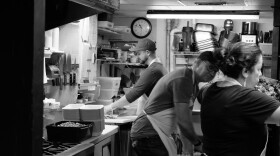A busy waterfront, the shipyard, Pease, restaurants, those iconic bridges, and a rich-but-fragile environmental landscape are just some of the things that put Portsmouth so boldly on the map.
During live interviews Tuesday, All Things Considered host Peter Biello and guests discussed some of what Portsmouth has going for itself, as well as a few challenges.
The live show was at Portsmouth Book & Bar, with Mayor Jack Blalock the first of five guests.
They Came To Eat Fish ...
Portsmouth Mayor Jack Blalock is also a restaurateur. He joined his father in the business back when the Old Ferry Landing opened on the city's waterfront in 1975. Local politics runs in the family, too. His father was a city councilor. https://youtu.be/Kk7nj0Zgr0E">Sitting down with Peter Biello, he discussed steps to update city infrastructure to keep pace with growth, and to address climate change. The city, which has declared itself an Eco-Municipality, recently passed a resolution to be carbon neutral.
"We'd like to see more workforce-type housing created here, and we're doing everything that we can within the limits that the state sets us, to encourage more workforce housing."
Blalock says the economic is booming, thanks in large part to the Port City being a destination. In Portsmouth, the arts contributes $58 million annually to the economy, according to a 2016 report.
Great Bay-Piscataqua
Melissa Paly is the Great Bay-Piscataqua Waterkeeper with the Conservation Law Foundation. She highlights the growth and development along the New Hampshire Seacoast, but notes communities are taking steps to improve and update infrastructure, such as the new Portsmouth wastewater treatment plant on Peirce Island.
"For many years we've been seeing a sort of downward spiral in the state of the health of this remarkable network of rivers and bays that we live near. The bottom line is that we still have a lot that's getting into our water that's making it hard for this to be a robust and healthy ecosystem. So we've got a lot of work to do but we are making some headway in certain areas."
Diversity, Anti-Bullying Efforts
Michele Holt-Shannon is with New Hampshire Listens, a civic engagement initiative of the Carsey School at the University of New Hampshire.
"We are finding out that -- school after school, community after community -- that teachers, parents, families, educators, administrators feel like ... that this is a new conversation," Holt-Shannon says.
She joined Rogers Johnson, president of the NAACP of the Seacoast, to discuss anti-bullying efforts and recent incidents of racism in New Hampshire. He also served as chair of the Governor's Advisory for Diversity and Inclusion.
"School districts, for the most part, have been absolutely absent for their role of actually providing protection to the student, and that's most troubling because those students are the ones who are hurt by these actions, and that hurt lasts for decades," Johnson says.
Squid: A Vehicle For Flavor
Chef Jeremy Sewall of Row 34 in Portsmouth (and Boston) is the grandson of a York, Maine lobsterman. His family's experience has crossover in his work today, including focus on sustainability and fresh seafood.
"We can't make villains out of the fishermen that are legally harvesting the ocean in a way that is really hard to do, but they're bringing fish back that is labeled maybe not as sustainable as some people would like them to be," Sewall says.







